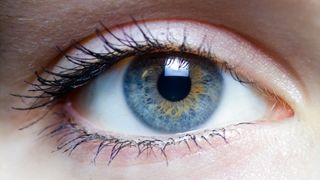However, not everyone can or should switch to contacts. For some, the idea of touching their own eyeballs on a daily basis simply isn’t something they want to do, and for others there are medical and physical issues to contend with. You shouldn’t wear contacts, for example, if you have dry-eye syndrome. For many, the shape of their eyes won’t allow for the safe insertion of contact lenses, and for others, they will simply be allergic to the disinfecting solution used to clean the lens. Solution is a vital part of your routine when learning how to clean contact lenses (opens in new tab), so it can’t be skipped. That’s an issue for people with sensitive eyes. While contacts are great for millions of Americans, and used on a daily basis, they simply aren’t an option for many glasses-wearers, who need to stick to shopping for the best eyeglasses online (opens in new tab). Below are some of the most common reasons why you shouldn’t wear contact lenses, while our feature on can you sleep with contacts in (opens in new tab) covers any nap-time questions you may have about lenses.
Reasons why contacts might not work
Dry-eye Syndrome Dry-eye syndrome is where the tear glands produce fewer tears. Although there are contact lenses and eye drops designed to help those with dry eyes, often it’s just not enough to make wearing contact lenses comfortable. There is the option to have plugs put in to help your eyes produce tears but, even then, many individuals still cannot wear contact lenses. And the eye-care bills have already started stacking up… Severe Nearsightedness Those individuals with severe nearsightedness find it hard to wear contact lenses because there aren’t any lenses with high enough power to correct their vision. The contact lenses do correct the vision up to a certain degree, but the contact lens effectiveness isn’t quite enough to produce an acceptable standard of clarity. Allergies Allergies Sometimes the reason certain people can’t wear contact lenses is because they are allergic to the disinfecting solution, or the contact lenses themselves. Every time they go to clean their contact lenses the body will react negatively, and the irritation is usually too uncomfortable. Some experts even suggest diabetics should stay away from wearing contact lenses because they are prone to infections and their bodies may not tolerate even a mild infection, and it may also take longer to cope with it. Age Cosmetic lenses have come a long way, and often children and pre-teens want to try contact lenses to change their look. Even if your child is able and willing to try contact lenses, it’s not always a good idea. Adolescence is the earliest they can try lenses out because the eyes of children are very tender and sensitive, and may not take well to the contacts. Plus, handling contact lenses is not an easy task and if put in the wrong way, could cause damage to the eyes. For more information on whether or not you can wear contact lenses, visit your local optometrist for a contact lens exam and fitting. The selection and design of contact lenses have evolved over the years, and there are many people that are able to wear contact lenses today that couldn’t a few years ago. And for those individuals that are unable to wear contact lenses: don’t get discouraged. Eyeglasses are becoming more and more stylish, and the designs of the frames are changing and becoming more attractive each year. For more advice on looking after your health, check out our guide to the best health insurance companies (opens in new tab).
